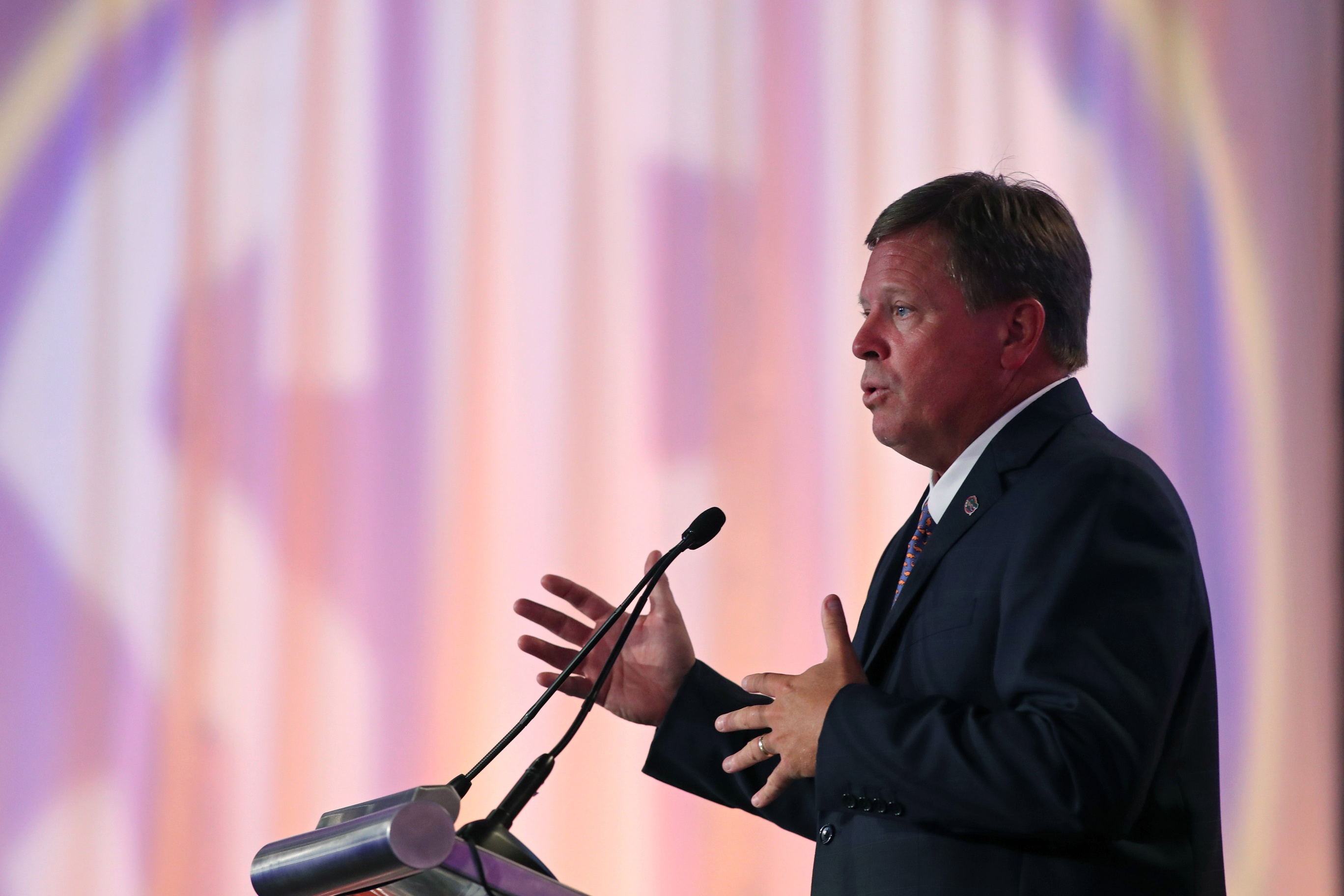
Without actually saying much of anything, Jim McElwain said a lot about himself
Jim McElwain is good at what he does.
He’s a passionate, successful coach who put Florida in consecutive SEC Championship games. He understands how to rebuild a program and change its identity, at least on the field. He also knows how to change the mood of a press conference.
When McElwain stepped up to the podium three minutes early Monday, he was laughing and joking with the media before he ever even mentioned the subject of suspensions. That, by the way, was the entire purpose of the press conference. By the time McElwain finished answering questions 28 minutes later, he was making cracks about Captain Kangaroo and talking about Florida’s “unbelievable scrimmage.”
All the while, he failed to give any concrete answers to the elephant in the room. What was the exact incident that led to the suspension of seven (!) Florida players? And what about Antonio Callaway? Why was he still being treated like a first-time offender when this was his third major off-the-field incident?
McElwain didn’t feel like getting into that. Like a politician, he sidestepped those issues and in his happy-go-lucky tone, talked about it being a learning experience and how everyone makes mistakes, which McElwain made sure to point out to the reporters in the room.
He knew what he was doing by blowing past the suspension topic. Many coaches would’ve taken a similar approach. They just wouldn’t have come across quite like McElwain did.

Can you picture Nick Saban or Urban Meyer walking into a room after seven of their players had just been suspended, and yucking it up with the media? McElwain is wired differently, for better or worse.
In this case, it was for worse.
In his head, he might’ve thought he came across as the stern disciplinarian for his “swift” and “quick” action of suspending each player for the Michigan game.
“You take something away that really means something to them,” McElwain said. “It doesn’t matter who you’re disciplining. In this case, their ability to not be around the team, they’re not going to be able to play in one of the greatest stadiums on national television. That’s going to hurt.”
McElwain sounded like the rich dad who took his son’s dessert away after he beat up a classmate in school. If the rumors of credit card fraud are true — we don’t know because McElwain never directly answered that question — that’s a more serious issue than missing one of 12 regular season games. Players have been kicked off teams for much less than claiming student financial aid debit cards were stolen.
Missing one game doesn’t change behavior. Does McElwain actually think that Callaway’s one-game suspension is going to turn his life around? That’s rich.
Speaking of Callaway, McElwain didn’t seem overly concerned that his star receiver was in trouble yet again after his offseason arrest. Instead, he focused on making it seem like he was just one of seven guys that made a mistake in judgment.
“Yeah, it’s not just Antonio. It hurts,” McElwain said. “It’s my responsibility, and as I’ve said before, the thing you really get out of coaching and the things that really mean so much, are the phone calls you get 5, 10, 20 years down the road from guys who made mistakes.
“It’s a learning experience. I think it’s good for all your guys to know there’s a consistency.
“I’ll never turn my back on anybody. That’s not what it’s all about.”
Consistency with McElwain is telling the media how much Callaway has changed, getting a phone call that he’s in trouble again and then slapping him on the wrist. Sure, McElwain doesn’t want to “turn his back on anybody.”
You know, as long as “anybody” is the star of his offense.

It’s a serious question at this point. If McElwain still won’t turn his back on Callaway, what does he need to do to get kicked off the team? It certainly looks like he’ll push those limits as long as he can. And why wouldn’t he? McElwain can change the narrative for Callaway as many times as he needs as long as he’s making plays.
It’s not “a learning experience” anymore with Callaway. What has he learned at this point? That if you’re a good football player, you can have three separate major incidences in two years and your coach will suspend you one game?
Instead, we learned that McElwain didn’t become a disciplinarian overnight. He’s still the guy who can’t take a joke about being the subject of a viral naked shark photo, but he doesn’t mind busting chops before he talks about seven of his players getting suspended.
Near the end of his availability, a reporter Captain Kangaroo’d his way back to the subject of Callaway. He read McElwain’s direct quote back to him about Callaway’s marijuana arrest in May about “hitting bumps in the road and learning from those bumps.” The reporter asked if McElwain had seen strides from Callaway before his latest incident.
McElwain circled for an answer, and wound up with this quote.
“Something we apply to the playing piece, but it really applies to life sometimes is, ‘Your actions speak so loudly, I can’t hear what you say.’”
Likewise.
Connor O'Gara is the senior national columnist for Saturday Down South. He's a member of the Football Writers Association of America. After spending his entire life living in B1G country, he moved to the South in 2015.







